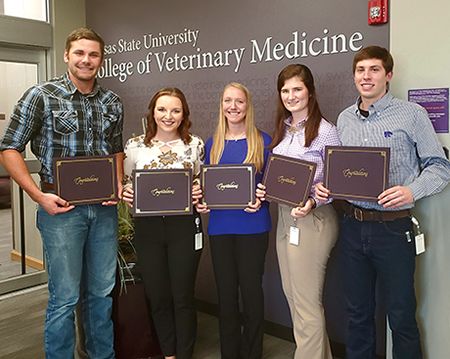K-State veterinary students to receive loan forgiveness for rural service
Program lends recipients $20,000 per year for tuition; amount is forgiven once grads practice in rural Kansas.

Veterinary Training Program for rural Kansas scholars from the College of Veterinary Medicine at Kansas State University. From left: Boyd Roenne, Rachel Jones, Kami Miller, Grace Luebcke and Jackson McCoole. (Photo courtesy of K-State University.)Five new students in the College of Veterinary Medicine at Kansas State University have been chosen for the largest veterinary scholarship program offered by the state of Kansas-the Veterinary Training Program for Rural Kansas-according to a release from the university.
This year's recipients are first-year veterinary students Jackson McCoole of Atchison, Rachel Jones of Manhattan, Grace Luebcke of Marysville, Boyd Roenne of Meriden and Kami Miller of Rexford.
“These students completed a rigorous selection process,” says Bonnie Rush, DVM, MS, DACVIM, dean of the College of Veterinary Medicine, in the K-State release. “They will complete additional training beyond the curricular requirements of the professional degree program to prepare them for success in rural practice. Scholarship recipients-past, present and future-create a unique community of supportive colleagues and represent the future of rural veterinary practice in Kansas.”
The Veterinary Training Program for Rural Kansas was passed by the state legislature in 2006 to provide a financial incentive for veterinarians to commit to practicing in rural areas in Kansas, the release states. Program participants are eligible for up to $20,000 in loans per year to pay their tuition. After completing their doctor of veterinary medicine, each graduate is required to work at a full-time veterinary practice in one of the 91 Kansas counties with fewer than 35,000 residents. For each year the graduate works in rural Kansas, $20,000 worth of loans are forgiven by the state. Graduates are expected to work four years in a designated county to receive $80,000 in loan waivers.
To date, 96% of graduates are completing or have completed their loan obligation through service, according to the release. Graduates who do not complete their service are required to repay the loan. The funds are reinvested through the addition of students to the program. Ninety-three percent of graduates who have completed their four-year commitment remain in a qualifying county. Seventy percent remain in the original practice and community they entered after graduation, the release states.
The students spend time during the summer and other breaks in the academic year learning about foreign-animal disease preparedness, natural disaster response, rural sociology, small business management and public health. They also spend three weeks in a rural veterinary practice during their senior year, applying the principles of small business management to rural veterinary practice.